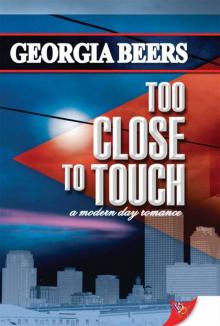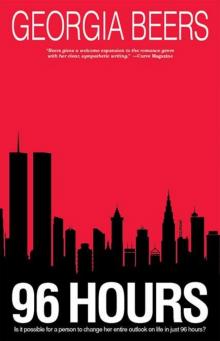- Home
- Georgia Beers
96 Hours
96 Hours Read online
96 HOURS
GEORGIA BEERS
To the wonderful people of Gander, Newfoundland. Thank you for opening your town, your homes, and your hearts and taking care of nearly 7,000 confused and stranded travelers on September 11, 2001. Your kindness and compassion are the very definition of humanity and you inspire this writer to be a better person.
CONTENTS
Foreword
September 11, 2001 Tuesday
Chapter 1
Chapter 2
Chapter 3
September 12, 2001 Wednesday
Chapter 4
Chapter 5
Chapter 6
Chapter 7
September 13, 2001 Thursday
Chapter 8
Chapter 9
Chapter 10
September 14, 2001 Friday
Chapter 11
Chapter 12
Chapter 13
September 15, 2001 Saturday
Chapter 14
Chapter 15
Chapter 16
October 15, 2001 Monday
Chapter 17
Chapter 18
Chapter 19
June 14, 2002 Friday
Chapter 20
About the Author
Acknowledgement
Bywater Books
Foreword
It’s difficult for me to watch the news. There’s so much fear and mayhem being covered that the occasional blurb of positivity is haphazardly thrown in as a fluff piece, such as coverage of a local dog show or a junior high school musical. It’s as if the network knows that viewers have reached their maximum capacity for devastation and need to coast for a moment before hearing about another shooting or the outbreak of a different strain of the same illness we hear about every year.
It’s as if America, despite the seemingly insurmountable issues we have to deal with on our own soil, is facing a new and more terrifying enemy across the ocean every year. Then again, with so many news outlets competing for ratings, I wonder sometimes if things really are that bad. Maybe. Probably. I hope not. Is it possible that this is just what is more interesting? Are the Democrats really so terrible? Yes, according to one news source. Are the Republicans responsible for everything wrong in America? Yes, according to another. Will you get shot tomorrow? Probably. Is it safe to travel outside of the country? Absolutely not.
And, to many, this endless stream of bad tidings has signaled the end of days, Armageddon, the rapture, etc . . . People say that things have never been as bad as they are now. Then again, I can’t help but think back on Paddy Cheyefsky’s “I’m mad as hell and I’m not going to take it anymore” monologue in Network, so beautifully delivered by Peter Finch. In that monologue, he talks about oil prices and the danger of leaving one’s home—and this was a film that came out in 1976! People thought things were pretty bad back then, too! People thought things were pretty bad when both of the Kennedy brothers and Martin Luther King, Jr. were assassinated in the 60s. Hell, people thought things were pretty bad when Elvis Presley was allowed to gyrate on national television! So are things really that bad now? One could see it that way, but . . .
I can’t imagine a better time to live than right now.
Despite all of the issues in the world, we are in a better position to understand one another than ever before. Pen pals can stretch to all corners of the world and communicate in an instant. Children are able to develop friendships and share their cultures, beliefs, and mutual fondness for Justin Bieber. Films and television shows from around the world can be shared, telling the stories of people who may not have had a voice before, thus raising awareness to social issues. For the first time in history, a black man and a woman hold two of the highest political positions possible. Women and people of color have more opportunities than ever before in history. And we are in the midst of a real, true fight for equality for the LGBTQ community.
This is an exciting time of change, much like the civil rights movement not that long ago, and straight allies stand beside our LGBTQ brothers and sisters. The movement has grown strong and the representation in art, film, literature and politics is greater than ever. Anti-bullying campaigns, support for No on Prop 8, and positive gay story lines on mainstream network television shows continue to educate people and support those who have been told that their lifestyle is anything other than “normal.” I am so proud of and inspired by Georgia for her work in telling these stories of women, how they find each other, love each other, hurt each other and ultimately live their lives. They aren’t defined by their sexual preference. They are people, period.
And, while there is still much to be done in the way of gaining acceptance and understanding, we have come a long way. The simple fact that you’re reading this book right now is a testament to the sacrifices that many brave women and men have made and the risks that they have taken to have their voices be heard. I encourage you to lift your own voice, to share Georgia’s stories of love and relationships and to be proud of your own stories that you create every day.
Erin Cummings
actress and philanthropist
ErinCummings.com & MittensForDetroit.org
September 11, 2001
Tuesday
Chapter 1
Erica Ryan had never fainted before in her life, but it felt like a distinct possibility. All of a sudden, the air in the plane’s cabin had become stifling—thick, making her feel like she was breathing through wet gauze—and way too warm. She unscrewed the vent above her head, which released a weak stream of air that did little more than blow her hair into her eyes, and she quickly went from a little light-headed to alarmingly nauseous.
God, she wished she had the window seat. Then she could press her cheek to the cool glass of the window, maybe stave off the worry that she might throw up all over her way-too-expensive Michael Kors suit. But no. Instead, a middle-aged man with a donut of salt and pepper hair slept like a baby, as he had since takeoff, snoring softly in her seat, leaning comfortably against her window. She narrowed her eyes at him, hoping to glare him awake. He snored on, leaving Erica in the aisle seat. 33B. Worst seat in the world. She stretched her right leg into the aisle, just to be annoying, and wanted nothing more than to kick off her cursed heels, but she’d read someplace that it was never a good idea to remove your shoes on a plane. Something about feet swelling and shoes being tighter when you put them back on. She was pretty sure this pair couldn’t possibly be less comfortable, but she wasn’t willing to risk it.
It was hard to recall a worse trip. She hadn’t wanted to go in the first place, but her boss insisted, said she was the right one for the job. She’d told him they weren’t ready, that they needed more time, but he wouldn’t take no for an answer. And how wrong had he been? She closed her eyes and tried not to think about all the work, the months and months and months of research that were all for naught. She felt the beginnings of a headache in the back of her skull, the distinctive, maddening scratching, like little workers with picks poking at the nerves that ran down the back of her neck.
The flight felt like forever, like she was stuck in some episode of The Twilight Zone and doomed to be wedged into her uncomfortable seat for all eternity, fed only snack-sized bags of stale munchies and miniature cans of Diet Coke (certainly more edible than the “meal” she’d been served). How long had they been in the air anyway? She looked at the silver Cartier watch on her wrist—the best thing to come out of her last relationship—and tried to figure out how long she’d been flying, but she’d set it for New York time, couldn’t remember exactly when their delayed flight had finally taken off from London, and trying to do the math made her head throb even more. She gave up with a sigh, wanting nothing more than to be home.
Tonight, you will be in your own bed. The thought
floated around her head teasingly, but she seemed unable to grab on and, instead, swallowed down another surge of nausea, which left a bitter taste in the back of her throat.
Trying to ignore the sweat beading on her upper lip, Erica looked around at the passengers on the full flight and let her gaze fall on the brunette two rows up and across the aisle in 31C. Pollyanna—that’s what Erica had nicknamed her in the airport because she seemed to be one of those people who elicited smiles and kindness from everybody who crossed paths with her. She was almost attractive, in a rumpled, beatnik kind of way; her dark hair in a haphazard ponytail, wisps of it escaping and doing their own thing, her jeans looking like they’d spent a day or two wadded into a ball and crammed into her backpack before being worn. On that backpack, she’d pinned an enormous rainbow button announcing her gay pride. Such billboard-like statements made Erica cringe and she’d tried to hide a disapproving grimace. Erica put her in her late twenties, maybe. She had watched her as they all waited to board. Pollyanna had chatted up a young couple with their little boy, then an older woman traveling alone, then the gay male flight attendant (aren’t they all?). Each person who came in contact with her looked instantly smitten with her, including the African-American couple she was conversing with now over the back of her seat.
“You’ve been to London seven times?” Pollyanna asked. She must have been kneeling on her seat because her forearms rested on the seat back and she set her chin on them as she spoke to the couple. “Wow. That was only my second time. I loved it, though. I’ll definitely go back.” From this angle, her blue eyes were startling, framed by dark brows and lashes.
“Our dearest friends moved there about five years ago,” the woman said to Pollyanna. “We miss them terribly and try to visit at least once a year.”
“And now you’re headed home?”
The woman nodded. “I love to travel, but I’m always ready to be back home.”
Amen to that, Erica thought.
“What about you?” the woman asked Pollyanna. “You headed home?”
“Well, my mom works in New York and lives in Connecticut, so I’m stopping by to visit with her for a few days. Then I’m off to stay with friends in San Francisco.”
“Why, you’re just a traveling machine, aren’t you?”
“I am!” Pollyanna laughed. “I believe in seeing as much of the world as possible. What’s that old saying? A rolling stone gathers no moss? Something like that.”
Erica rolled her eyes, then dropped her head into her hand and rubbed at her temple. The headache hadn’t grown, but it hadn’t receded either, and the pressure in the cabin wasn’t helping matters. When she looked up again, blue eyes caught hers and held them for a split second longer than was comfortable. Pollyanna released her with a wink.
Before Erica had a chance to examine why she got a tingle from being caught by those eyes, the public address system clicked and the pilot came on.
“Ladies and gentleman, this is your captain. I’m afraid we need to make a slight detour. Nothing to worry about, no need for concern, but we’re going to set down a little off our course. We’ll begin our descent shortly, so please return to your seats. The flight attendants will be around to secure the cabin.”
Confused murmurs washed through the cabin like a wave, people wondering what was going on. Erica could pick out snippets of questions that echoed the ones running through her head: Was there something wrong with the plane? What exactly did “a little off our course” mean? What aren’t we being told?
Immediately wondering how she was possibly going to make her connecting flight if they were late getting to New York, Erica felt her earlier joy at the idea of her own bed slipping farther and farther away, fading into invisibility like a ghost. “God damn it.”
She looked around her as the flight attendants scurried down the aisles like worker bees, pulling seats to the upright positions and collecting garbage. Every one of them seemed serious, concentrating, any expressions of good humor gone. Here and there, one would exchange an anxious glance with another.
“What’s going on?” Erica heard somebody behind her ask. “Is there something wrong with the plane?”
“I’m sure it’s nothing to worry about, ma’am.” Erica craned her neck to see the flight attendant who’d been chatting with Pollyanna in the airport smile at an elderly woman a couple rows back. “You heard the captain.” As soon as he had turned away from the woman, the smile fell from his face and his Adam’s apple bobbed in a hard swallow.
Another flight attendant clicked on the intercom and told the passengers to buckle up. Nervous faces glanced around at one another and the murmur of puzzled and nervous conversation continued, a steady hum permeating the cabin. Erica saw Pollyanna reach across the aisle and pat the hand of the person sitting there, somebody Erica couldn’t see. Whoever it was, they gripped the armrest of their seat so tightly, their knuckles had gone white.
“Don’t worry,” Pollyanna reassured them. “It’ll be fine. The pilot knows what he’s doing.”
Really? How can you be so sure?
“Is your seat belt buckled, hon?” The flight attendant was looking down at her. His expression was kind, but his eyes still held apprehension.
“Oh.” Erica clicked the belt. “It is now.”
“Thanks. Great jacket, by the way.” He touched her shoulder and moved on to the next row.
Snoring Man stretched his arms over his head and yawned like Rip Van Winkle. “What’s going on?” he asked her.
Erica opened her mouth to answer when she felt the plane banking to the right. It really wasn’t any less smooth than any other time the plane had made a turn, but because of the unease creeping through her body, it felt ominous. Her stomach did a flip-flop, reminding her that only minutes ago she was worried she might toss her cookies.
“Are you okay?” Snoring Man asked, touching her forearm. “You’re really pale.”
“I think so.” I hope so. Erica swallowed down the bile that rose in her throat. Yep. Definitely the worst trip ever.
“Flight crew, prepare for landing,” the pilot ordered crisply.
The flight attendants adjourned to their jump seats, so Erica could no longer see their faces, see if they still looked apprehensive, which was exactly how the rest of the passengers looked.
“What the fuck?” Snoring Man’s voice was almost a whisper as he looked out the window. Erica followed his gaze, where she could see at least three other planes—in the distance, but much closer than she expected. “What the hell is going on?”
Erica wasn’t the kind of person to get nervous easily. She was grace under pressure, a good man in a storm, all those stupid clichés, but this rattled her. Why were so many planes so close? In plain view? Were they getting some kind of escort in case they crashed? Good lord, were they going to crash? Was there something wrong with the plane and the crew just weren’t telling the passengers to prevent all-out panic? Judging from the expressions on faces around her, others were following a similar train of thought. She could read them just as easily as if they were speaking aloud. They say that the odds of being in a plane crash are long ones, but could this be it? Is my number up? Am I about to buy the farm? Kick the bucket? Bite the dust?
Jesus, Ryan, get a grip! She tried to shake off the anxiety and settle her stomach, tried to steady her breathing and pick something to calm her nerves, an object on which to focus. She needed to calm the hell down.
Her gaze landed two rows up and across the aisle.
She couldn’t see Pollyanna’s face, she could see only the lower part of her jean-clad left leg and her left forearm and hand as it gripped her armrest just as tightly as everybody else did theirs. She wore a wide silver ring on her middle finger, and something about it held Erica’s concentration. Pollyanna’s fingers were slender, and Erica could make out the delicate blue lines of veins on the back of her hand, visible through the China-doll white of the skin. She forced herself to stare, to press all of her attention, al
l of her worry, onto that silver ring. As she did, her heart rate began to ease, her breathing began to steady, and the churning in her belly receded a bit. Long moments went by and she concentrated on the hum of the engine, listening for any noise that sounded suspect, but hearing none.
“Where the hell are we landing?” Snoring Man asked as their altitude continued to slowly fall. “It sure isn’t JFK.”
She looked past him and out the window, where the ocean was gone and she could see nothing but trees, trees, and more trees. “Jesus, is there even an airport?” she said quietly, more to herself than to her neighbor.
“I was wondering the same thing.”
The landing gear came down, the loud noise jolting Erica, setting her heart to racing. She took a deep breath and returned her gaze to that silver ring, kept her eyes glued there, thankful Pollyanna was still holding tightly to her armrest. Erica’s jaw was clenched and she consciously relaxed it.
Finally, after what felt like an eternity of nothing but forest, the never-ending expanse of green fell open and there was asphalt. Blessed asphalt! Hot, black, bathed in sunshine. There really was an airport after all.
“Oh, thank god,” Erica muttered aloud as the plane touched down, hard, roughly. Only then did she wonder if the pilot had been as nervous as his passengers. If there was a problem, he knew about it and still had to fly the plane. But at least they were on the ground. They couldn’t plunge thousands of feet to their deaths if they were already on the ground. Erica finally pulled her gaze from Pollyanna’s ring, rested her head back against the headrest, and blew out a huge breath as many of the passengers applauded. The nausea seemed to give up, deciding to pack it in and try another day. “Oh, thank god,” she said again.
The mood in the cabin went from quiet fear to jubilation in a matter of seconds, people all around smiling and playfully wiping their brows. Erica took it all in, watching Pollyanna as she finally released her armrest and smiled at the person across the aisle from her. The PA clicked on and the captain spoke.

 Hopeless Romantic
Hopeless Romantic Blend
Blend Flavor of the Month
Flavor of the Month One Walk in Winter
One Walk in Winter Zero Visibility
Zero Visibility The Do-Over
The Do-Over Fresh Tracks
Fresh Tracks Dare to Stay (Puppy Love Romances Book 3)
Dare to Stay (Puppy Love Romances Book 3) Mine
Mine Right Here, Right Now
Right Here, Right Now Calendar Girl
Calendar Girl Rescued Heart
Rescued Heart Run To You (Puppy Love Romance Book 2)
Run To You (Puppy Love Romance Book 2) Olive Oil and White Bread
Olive Oil and White Bread Too Close to Touch
Too Close to Touch The Shape of You
The Shape of You 96 Hours
96 Hours